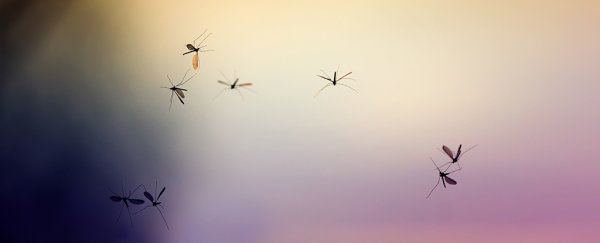We know that plastic pollution is a major problem for the world's oceans, but scientists just discovered a new way that discarded microplastics are making their way out of the water and into other food chains – through mosquitoes.
What's happening is mosquito larvae are ingesting microplastics as water-dwelling larvae, and those plastic particles are sticking around as they transition into flying mosquitoes.
Those adult insects provide tasty snacks for birds and bats in the air above, which means microplastics are now ending up in the stomachs of land animals, not just marine creatures.
This process is technically known as ontogenic transference, meaning it happens as the organism matures and moves habitats.
Once the plastic-carrying mosquitoes have been eaten by birds and bats, the pollution can then make it further into other food chains and ecosystems, according to the researchers from the University of Reading in the UK.
"This is eye-opening research, which has shown us for the first time that microplastics are able to navigate several life stages in flying insects, allowing them to contaminate all kinds of living creatures who would not normally be exposed to them," says one of the researchers, biological scientist Amanda Callaghan.
"It is a shocking reality that plastic is contaminating almost every corner of the environment and its ecosystems."
Callaghan and her colleagues fed fluorescent plastic microbeads to mosquito larvae in lab conditions then monitored their growth through a microscope.
The plastic remained in place through the non-feeding pupal stage and into the adult insect, via the Malpighian tubules (structures equivalent to the human kidneys).
Microplastics like these can take hundreds of years to be broken down in the environment, and the study showed that the smaller the plastic beads were, the more likely they were to stick around in the bodies of the mosquitoes.
We already know that plastics polluting our oceans and waterways can have a damaging effect on wildlife and make progress through the food chain.
Now we know these harmful, microscopic fragments stick around as mosquitoes change form and make their way out of the water too.
 Fluorescent microplastic in a mosquito abdomen. (University of Reading)
Fluorescent microplastic in a mosquito abdomen. (University of Reading)
Friends of the Earth plastics campaigner Emma Priestland, who wasn't involved in the research, said the findings were "disturbing".
"Knowing that plastic can be transferred from the larval stage to the adult mosquito, which then serves as food to a multitude of larger animals, highlights the urgency with which we need to drastically reduce our use of plastic," Priestland told the BBC.
As well as mosquitoes, insects like mayflies, dragonflies and midges start life in ponds and puddles before making their way into the outside world, where they're often eaten by bigger creatures – so the problem could go way beyond the boundaries of this study.
We know that as plastic seeps into the natural world it can get passed further and further between animals and ultimately have serious consequences for natural ecosystems.
Let's hope this new study helps underline the potential scale of the problem and spurs efforts to cut back on plastic use.
"Much recent attention has been given to the plastics polluting our oceans, but this research reveals it is also in our skies," says Callaghan.
The research has been published in Biology Letters.
